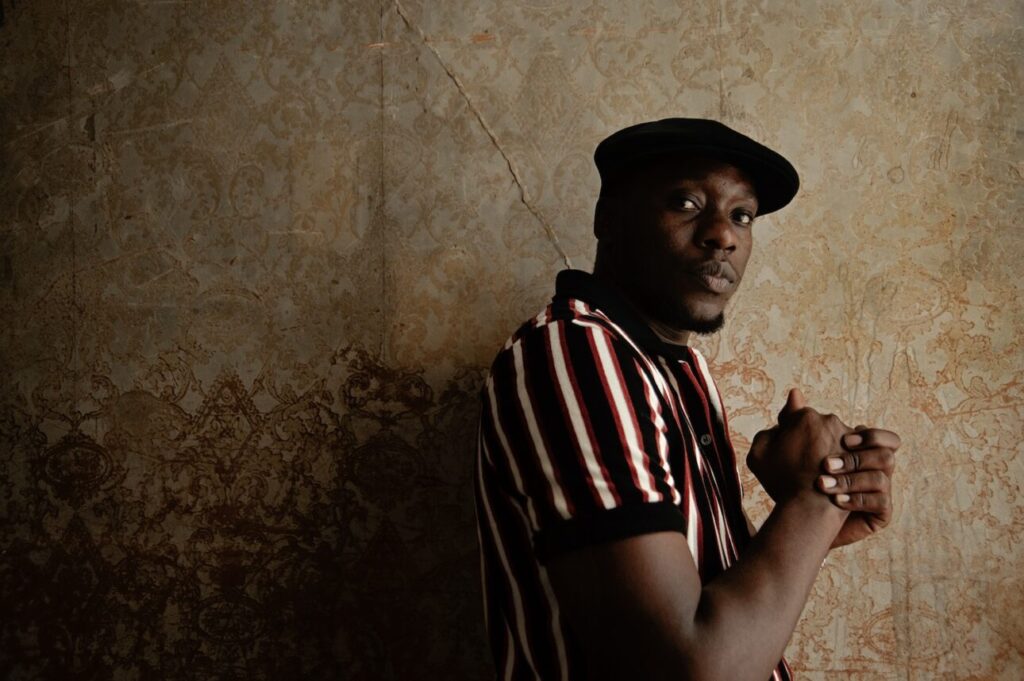Maybe there’s some irony in the fact that the first time Jon Muq ever flew on an airplane, his destination was a cruise ship that would take him on a months-long journey at sea. The Ugandan artist, whose debut album, FLYING AWAY (Easy Eye Sound) is out on May 31, has never let the endpoint confine the journey.
“I just do things without a rule,” the 31-year-old says, sitting in a small bar area in the back lobby of the historic Blue Moon Hotel on New York’s Lower East Side. “Because the rule creates the boundary for you. And the boundary creates a style.”
The point, as Muq intends it, is that his music is style-less. Listen and you’ll hear anything from Jon Batiste to the British invasion, from Lenny Kravitz to ’80s pop. At the moment, at this nascent stage in a career, style-less can also mean limitless. His amorphous yet delightful collection of songs — a variety birthed, in part, by his initial introduction to Western music, when he heard the song “We Are The World” as a teenager and marveled at the diverse and disparate voices that came together for one final song — evades any rote characterization, thereby bypassing anything that might fence him in.
Now living in Austin, Muq has been busy this year, rolling toward the album’s debut. In March, he made his way around his new hometown’s local venues during South By Southwest, among other stops. He’s booked solid between this summer’s festival circuit, along with a European tour and a ridealong on the “International Players Tour” in the fall with the Black Keys, whose frontman Dan Auerbach produced Muq’s album.
Auerbach discovered Muq after watching a YouTube video that the singer had posted a few years earlier. Muq, sitting in a Texas living room and filming himself, plays a guitar adorned with two cartoonish stickers of eyes, and offers a stunningly soulful take on the Beatles’ classic “Blackbird.”
“Dan told me he watched the video of me, and then he had to reach out and look for where I was,” Muq says. “I got a message, and then when I asked my friends, they were like, ‘Did you say Dan Auerbach? That’s a message you want to reply to.’
“I had never heard of the Black Keys or Dan Auerbach before.”
Growing up in a suburb of Kampala, the capital of Uganda, Muq chased music wherever he could. He fell in love with the sound of the school band playing the national anthem, and taught himself to play the bugle, then found a guitar. But his greatest instruments were his voice and his curiosity. He speaks seven languages, mostly rare tribal dialects from back home, as well as English and Luganda, and any time he heard music, he had to learn what it was, how to create it, why it sounded the way it did. “It built up slowly,” he says. “And since Uganda has nothing much to really make you know your purpose, you have to search for it.”
That search, he says, saved his life. His friends would go off doing what kids do, getting in trouble with drugs or worse. But Muq had gone the other way, following the sounds he was hearing.
“Every time I followed sound, and followed the music direction, it led me farther and farther.” So it was that when a booker for Norwegian Cruise Lines saw a video of him singing for homeless children on the street in Uganda, they hired him to perform on the Norwegian Sun, which traversed routes around the Bahamas and to South America. He had never been on a plane before, never gone farther from his home in Uganda than neighboring Kenya. And even now, he can’t necessarily say whether he was running from something or running to something, a paradox profoundly visible up and down the track list of FLYING AWAY, whose 12 songs seem united by a theme of searching and running. The lead single, “Runaway,” seems explicitly aware of the emotional conflict.
“It’s in my blood I was born to roam. Where I go there is no returning. I feel like a runaway.”
It takes barely any effort to hear the echoes of “Blackbird,” of only waiting for your moment to be free.
***
Muq would perform a few times a day, initially at one of the ship’s bars. Eventually, he had to move to bigger locations because of the crowding. For all the signs of success, though, it was a strange and uncomfortable change from anything he knew back home. He had boarded the ship for the first time as a scared kid, his ribs showing through his shirt, bones practically popping through his neck. From a life of total food insecurity, he found himself on a luxury liner where buffets run all day, and where restaurant patrons struggling to decide between two dishes just order both. “It was a different planet,” he says.
As a performer on the ship, Muq had options. He could, of course, eat in the crew quarters, where the pedestrian food was still more plentiful and varied than anything he had seen before. But he also was allowed to eat among the guests. He never could bring himself to do it, though. Struggling with his understanding of life and necessity and opportunity being cleaved, he couldn’t shake the cultural norm from back home, where you ate what little you were served.

Muq just saw food. So much food. He didn’t understand the class struggles that his acquaintances on the ship were feeling, that there was the entirety of a global struggle in the difference between upstairs and downstairs. Food was food.
“I had too much food on my plate,” he says. “As if it’s not going to be there tomorrow. I had never seen such options of food. I grew up with one option. And what you have is what you eat. No thinking about what you don’t have.
“That’s how you grew up thinking about life. And you can’t crave what you won’t get. So it cuts up that craving. You’re like, ‘Oh, what’s today’s food?’ Rice and beans. That’s it.”
Muq didn’t crave, and he didn’t live the life of luxury his fellow performers could have chosen. He continued searching, continued running, if metaphorically. As he would write on the album’s track, “Flying Away From Home,” a song that begins with a verse about leaving Uganda at 23 and sailing into the night, “Sometimes you have to search before you find it. The light can seem so very far away. But everything you left so far behind it. Is in your heart to stay. To help you find your way.”
Still running, still searching. As he looks back at the journey years later, and the obvious ways his first journey from Uganda led him to Austin, Muq defends his ambition.
“It takes courage to run,” he says. “From either good or bad, it just takes courage.”
***
Later that night, a few blocks away at New York’s Rockwood Music Hall, Muq stands alone on stage, playing the same guitar with the cartoon-eye decals. He engages the crowd with stories about his life, about the songs, about the intersection between the two. His soft-spoken, yet commanding presence is a major shift from his persona back home, where he often felt silenced in a house with his sisters. So he made music his voice, even as friends told him he was a silly dreamer. “Are you competing with Chris Brown?” he says, mimicking the naysayers. “You can’t do it.” But here he is, owning the small room.

It’s a challenge to make his new country feel like home. The tribal nature of Uganda creates a natural community, but America is more cloistered and often more lonely. “It’s different,” he says. “Everyone is an eggshell that you need to crack.” That goes for all the people who see him play and talk with him after shows, to the executives in an industry he doesn’t yet fully understand, to the legends (the likes of Billy Joel, Norah Jones, and Mavis Staples) that he has observed while opening for them on the road.
If you spot echoes of a kid on his first journey, presented with more food than he’s ever seen, yet choosing to eat the rice and beans of his upbringing, that’s the real Jon Muq. And that’s the man and the artist you hear throughout FLYING AWAY.
“It’s about real life,” he says of the album. “Normal things that everyone at least experiences in their lifetimes. It doesn’t need to speak to everyone. But I at least wanted the song to speak to someone in a different way.
“I met a Ukrainian who listened to the song ‘Runaway’ and said, ‘Hey, can we meet? Because I feel like in this whole world, only one person has ever described my life. That’s my whole life in that song.’ And I met them, and I was like, ‘I’m glad this song spoke to you. I always wanted the song to be a voice.’”
Thus far, the journey has been extraordinary, and like the narrator of “Runaway,” there’s no returning. It’s not that Muq can’t go back to Uganda; the African nation will always be home, and if this album succeeds, he hopes to use whatever newfound wealth he comes by to build a maternity clinic near his hometown. It’s more that, at some point, you find what you’re seeking. Muq talks about the festivals on his docket for this year. Asked about ambition, about the fact that as a debut album begets a follow-up, and whatever comes after, his name should get bigger and higher on the festival lineups, he stares, surprised. Like with a cruise ship’s buffet, he hadn’t put together the politics and economics of a festival poster.
“I thought maybe the paper was too small,” he says. “Now it’s scary. I don’t want my name small. I want it in the big font.”
Or, perhaps you prefer the Paul McCartney version. All Muq’s life, he was only waiting for his moment to arise.
To see our running list of the top 100 greatest rock stars of all time, click here.
